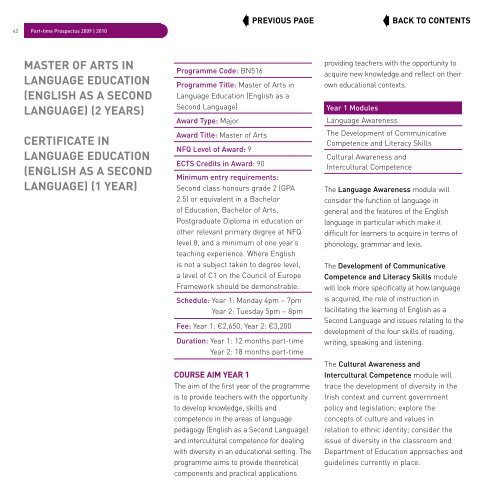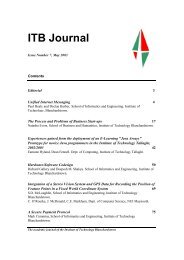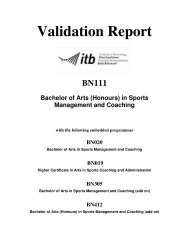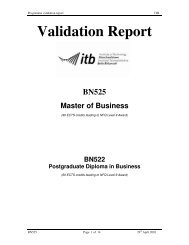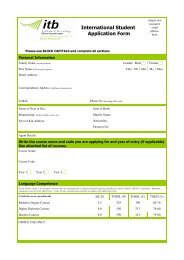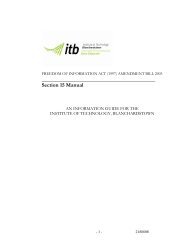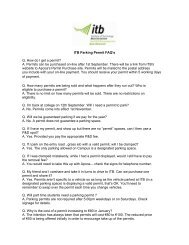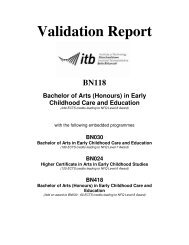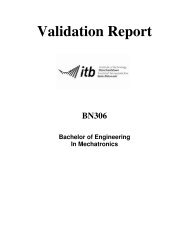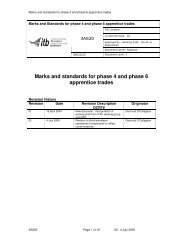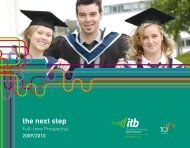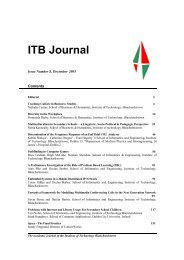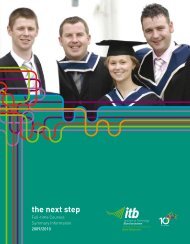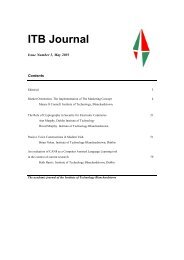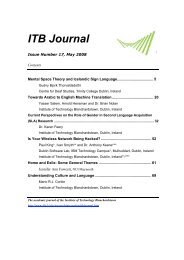new horizons - Institute of Technology Blanchardstown
new horizons - Institute of Technology Blanchardstown
new horizons - Institute of Technology Blanchardstown
Create successful ePaper yourself
Turn your PDF publications into a flip-book with our unique Google optimized e-Paper software.
Previous Page BAck to Contents Next Page ➧<br />
BAck to Contents<br />
42 Part-time Prospectus 2009 | 2010<br />
Language Courses 43<br />
MASTER OF ARTS IN<br />
LANGUAGE EDUCATION<br />
(ENGLISH AS A SECOND<br />
LANGUAGE) (2 years)<br />
Certificate in<br />
Language Education<br />
(English as a second<br />
Language) (1 year)<br />
Programme Code: BN516<br />
Programme Title: Master <strong>of</strong> Arts in<br />
Language Education (English as a<br />
Second Language)<br />
Award Type: Major<br />
Award Title: Master <strong>of</strong> Arts<br />
NFQ Level <strong>of</strong> Award: 9<br />
ECTS Credits in Award: 90<br />
Minimum entry requirements:<br />
Second class honours grade 2 (GPA<br />
2.5) or equivalent in a Bachelor<br />
<strong>of</strong> Education, Bachelor <strong>of</strong> Arts,<br />
Postgraduate Diploma in education or<br />
other relevant primary degree at NFQ<br />
level 8, and a minimum <strong>of</strong> one year’s<br />
teaching experience. Where English<br />
is not a subject taken to degree level,<br />
a level <strong>of</strong> C1 on the Council <strong>of</strong> Europe<br />
Framework should be demonstrable.<br />
Schedule: Year 1: Monday 4pm – 7pm<br />
Year 2: Tuesday 5pm – 8pm<br />
Fee: Year 1: €2,650, Year 2: €3,200<br />
Duration: Year 1: 12 months part-time<br />
Year 2: 18 months part-time<br />
COURSE AIM YEAR 1<br />
The aim <strong>of</strong> the first year <strong>of</strong> the programme<br />
is to provide teachers with the opportunity<br />
to develop knowledge, skills and<br />
competence in the areas <strong>of</strong> language<br />
pedagogy (English as a Second Language)<br />
and intercultural competence for dealing<br />
with diversity in an educational setting. The<br />
programme aims to provide theoretical<br />
components and practical applications<br />
providing teachers with the opportunity to<br />
acquire <strong>new</strong> knowledge and reflect on their<br />
own educational contexts.<br />
Year 1 Modules<br />
Language Awareness<br />
The Development <strong>of</strong> Communicative<br />
Competence and Literacy Skills<br />
Cultural Awareness and<br />
Intercultural Competence<br />
The Language Awareness module will<br />
consider the function <strong>of</strong> language in<br />
general and the features <strong>of</strong> the English<br />
language in particular which make it<br />
difficult for learners to acquire in terms <strong>of</strong><br />
phonology, grammar and lexis.<br />
The Development <strong>of</strong> Communicative<br />
Competence and Literacy Skills module<br />
will look more specifically at how language<br />
is acquired, the role <strong>of</strong> instruction in<br />
facilitating the learning <strong>of</strong> English as a<br />
Second Language and issues relating to the<br />
development <strong>of</strong> the four skills <strong>of</strong> reading,<br />
writing, speaking and listening.<br />
The Cultural Awareness and<br />
Intercultural Competence module will<br />
trace the development <strong>of</strong> diversity in the<br />
Irish context and current government<br />
policy and legislation; explore the<br />
concepts <strong>of</strong> culture and values in<br />
relation to ethnic identity; consider the<br />
issue <strong>of</strong> diversity in the classroom and<br />
Department <strong>of</strong> Education approaches and<br />
guidelines currently in place.<br />
Duration<br />
The Year 1 programme is run in blended<br />
learning mode with three hours per week<br />
class contact and an equivalent workload <strong>of</strong><br />
reading and research on a weekly<br />
basis supported by on-line resources<br />
through Moodle.<br />
Exit to Achieve Certificate in<br />
Arts in Language Education<br />
(English as a Second Language)<br />
An award with the title Certificate in<br />
Language Education (English as a<br />
Second Language) may be granted if<br />
learners leave this programme after<br />
successfully completing the first year<br />
modules (36 ECTS credits).<br />
COURSE AIM YEAR 2<br />
The aim <strong>of</strong> Year 2 <strong>of</strong> the programme is to<br />
build on skills acquired in year 1 and to<br />
develop more specialised knowledge and<br />
competencies in the areas <strong>of</strong> language,<br />
culture and society, and language learning.<br />
Year 2 Modules<br />
(2 Mandatory Modules + 1 Elective)<br />
Mandatory modules:<br />
Second Language Acquisition:<br />
Theory and Practice<br />
Research Project (14,000 words)<br />
Elective modules:<br />
Race and Ethnicity: Theory and Practice<br />
Computers in Language Teaching<br />
and Learning (CALL)<br />
Basic knowledge <strong>of</strong> computing<br />
skills required.<br />
Note: elective modules will run subject to<br />
sufficient numbers<br />
The SLA: Theory and Practice module<br />
is designed to provide teachers with<br />
expertise in the area <strong>of</strong> applied linguistics<br />
and develop language teacher awareness<br />
through the analysis <strong>of</strong> learner language,<br />
teaching and learning processes, and<br />
engagement in action research in the<br />
context <strong>of</strong> the language classroom.<br />
The Race and Ethnicity: Theory and<br />
Practice module aims to critically<br />
theorise and contextualise the concepts<br />
<strong>of</strong> ‘race’ and ‘ethnicity’, with a view<br />
to providing teachers with a greater<br />
understanding <strong>of</strong> the problems relating<br />
to such categorisation and how this may<br />
impact on pr<strong>of</strong>essional practice and<br />
contemporary Irish society at large.<br />
The Computers in Language Teaching<br />
and Learning (CALL) module introduces<br />
participants to the theoretical basis for<br />
and practical use <strong>of</strong> computer assisted<br />
language learning in the language<br />
classroom. It will focus on both using and<br />
critically evaluating available products, and<br />
designing and developing their own learning<br />
materials using authoring s<strong>of</strong>tware.<br />
The Research Project module aims<br />
to produce competent researchers<br />
through the development <strong>of</strong> participants’<br />
powers <strong>of</strong> critical analysis, the ability<br />
to apply theory to practice and relate<br />
their learning to the field <strong>of</strong> education<br />
in a coherent and logical manner. The<br />
research project will be linked to one <strong>of</strong><br />
the thematic areas <strong>of</strong> the course.<br />
Duration<br />
Year 2 <strong>of</strong> the programme will comprise<br />
two taught modules with a course<br />
contact time <strong>of</strong> three hours per week in<br />
semesters 1 and 2. Students normally<br />
complete the research project in<br />
the semester immediately following<br />
completion <strong>of</strong> the two taught modules.<br />
Students will need to attend the college<br />
for three research methodology seminars<br />
and individual meetings with the<br />
supervisor assigned to them in the course<br />
<strong>of</strong> this semester.<br />
An award with the title Post Graduate<br />
Diploma in Arts in Language Education<br />
(English as a Second Language) may<br />
be granted if learners leave this<br />
programme after successfully<br />
completing 60 ECTS credits.<br />
APPLICATION<br />
For further details and an application<br />
form please contact the marketing team<br />
on 01 885 1000 or e-mail: info@itb.ie.


